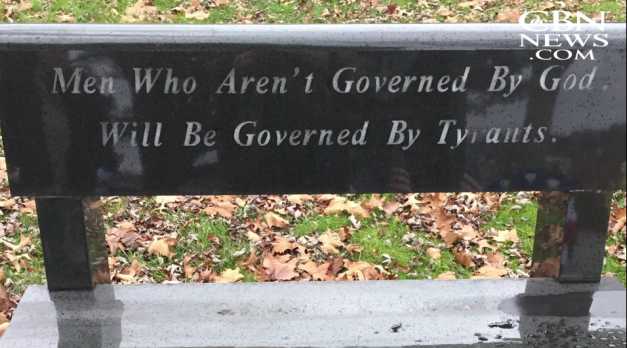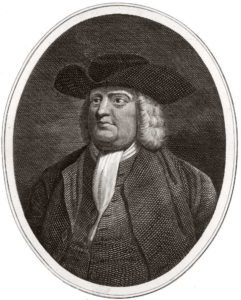 OIL CITY, Pa. — A city council in Pennsylvania has unanimously voted to remove a park bench that was meant to honor veterans due to objection from an atheist group regarding a God-centered inscription on the display that is attributed to the state’s founder.
OIL CITY, Pa. — A city council in Pennsylvania has unanimously voted to remove a park bench that was meant to honor veterans due to objection from an atheist group regarding a God-centered inscription on the display that is attributed to the state’s founder.
“From an administration standpoint, this is heading toward litigation,” Mark Schroyer, the city manager of Oil City, told Explore Clarion. “At that point, we have to decide what are our wins, losses and gain. … Our collective opinion is, if it’s winnable, it would be so costly [that] what would we actually be gaining other than taking the stand our residents are asking?”
“Our biggest concern is exposure to attorney fees,” also remarked City Solicitor Robert Varsek. “We would be sued for injunctive relief where they order the city to remove the bench, and for damages and also be sued for attorney fees under the civil rights law.”
As previously reported, American Atheists (AA) sent a letter last November to the mayor of Oil City to request that the Justus Park bench, which was donated in 2003 by a local branch of the Veterans of Foreign Wars (VFW), be removed. It assert that the inscribed text violates the U.S. Constitution.
“Men who aren’t governed by God, will be governed by tyrants,” the bench reads, paraphrasing a quote that is often attributed to Pennsylvania founder William Penn, a Quaker who wrote a number of theological books and who once stood trial for “causing a tumult” in preaching in the streets.
AA contended that the quote violates the Establishment Clause of the U.S. Constitution, which instructs that “Congress shall make no law respecting an establishment of religion.” The group also said the text is disrespectful to non-Christians.
“[T]he Tyrants Bench contains an overtly religious message which endorses one particular religious viewpoint: Christianity. The statement that ‘Men who aren’t governed by God will be governed by tyrants’ not only has absolutely nothing to do with honoring our service members, but is derisive toward the all non-Christian American service members who have served and died for this country,” its letter asserted.
But local residents pushed back against AA, launching a “Save the Bench” campaign and pledging over $17,000 should the city face a legal challenge.

“We ask that each one of you recognize that these groups, such as this atheist organization, are fighting a bigger battle and using Oil City as a pawn in their strategy to further their agenda,” campaign co-organizer Heather Mohnkern told city council members during the meeting on Thursday. “For council to be swayed by one voice over the many they have heard in defense of our position would be tragic.”
Rob Lazar expressed concern over what might be the next freedom to be stripped away if the bench is allowed to be removed.
“We celebrated here in Oil City a Good Friday breakfast. Following the breakfast was a cross walk. A group walk around the city with a cross indicating the greatest thing that has every happened to mankind. What’s next? Will we not be allowed to hold the cross walk on city streets?” he asked.
“Scripture says government gets its authority from God Himself,” Lazar added. “It’s not about a bench, but what’s written on it. Where do we draw the line?”
Nonetheless, due to legal and financial concerns, city council members voted to return the bench to the VFW, which requested that if the display was removed, that its other non-religious bench and memorial be returned as well. The VFW says that it will now erect the displays on its own property.
As previously reported, in a recent dissenting opinion in a New Mexico Ten Commandments case, 10th Circuit Court of Appeals Judges Paul Kelly, Jr. and Chief Judge Timothy Tymkovich noted that the Establishment Clause is being interpreted incorrectly and not in “the historical understanding of an ‘establishment of religion,’ and thus with what the First Amendment actually prohibits.”
They explained that “[e]stablishment was … the norm in the American Colonies. Exclusive Anglican establishments reigned in the southern states, whereas localized Puritan establishments were the norm in New England, except in Rhode Island.”
This began in Europe, “the continent of origin for most American colonists,” Kelly outlined. “[E]ach country had long established its own state church—a generalized version of cuius regio, eius religio—over which each government exercised varying degrees of control. Germany and Scandinavia had official Lutheran establishments; Holland, a Reformed state church; France, the Gallican Catholic Church; Ireland, the Church of Ireland; Scotland, the Church of Scotland; and so on.”
Therefore, the Establishment Clause of the U.S. Constitution regarding “respecting an establishment” only referred to showing favoritism to one state establishment over another, and solely applied to the federal government.
“From the words of the text, though, two conclusions are relatively clear: first, the provision originally limited the federal government and not the states, many of which continued to support established churches; and second, the limitation respected only an actual ‘establishment of religion,’” the federal judges outlined.
Become a Christian News Network Supporter...


